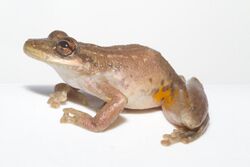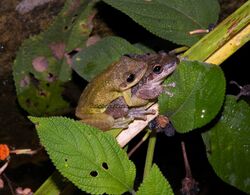Biology:Scinax ruber
| Scinax ruber | |
|---|---|

| |
| Scientific classification | |
| Domain: | Eukaryota |
| Kingdom: | Animalia |
| Phylum: | Chordata |
| Class: | Amphibia |
| Order: | Anura |
| Family: | Hylidae |
| Genus: | Scinax |
| Species: | S. ruber
|
| Binomial name | |
| Scinax ruber (Laurenti, 1768)
| |
| Synonyms[2] | |
|
Hyla rubra Laurenti, 1768 | |
Scinax ruber is a species of frog in the family Hylidae[1][2][3][4] which is known in English as the red snouted treefrog or red-snouted treefrog, sometimes also Allen's snouted treefrog, the latter referring to the now-synonymized Scinax alleni. This widespread species is found in much of Amazonian and northern coastal South America and into Panama, as well as in some Caribbean islands as introduced populations. It is a complex containing several cryptic species.[1][2][4]
Range
S. ruber is widespread from sea level to around 2,600 metres throughout the Amazon Basin and the Guiana Shield in South America (in Brazil , Colombia, Ecuador, French Guiana, Guyana, Peru, Suriname, and Venezuela). It is also found in central Panama and the eastern lowlands of Darien Province in Panama, as well as in Trinidad and Tobago.[1][2] It is an introduced species on Martinique, Puerto Rico, and Saint Lucia.[1] It is considered an invasive species on Martinique, threatening native frogs.[5]

Description
Adult males measure 29–41 mm (1.1–1.6 in) and adult females 37–44 mm (1.5–1.7 in) in snout–vent length.[3][6] The snout is rounded and non-acuminate. The tympanum is distinct. Dorsal skin is smooth to finely tuberculate. The dorsum is tan to dull green usually with wide creamy tan to yellow dorsolateral stripe with dark borders that extends from the eyelid to the sacrum. Also a discontinuous tan middorsal is usually present. The flanks are cream with yellow spots, usually edged with black in groin. The posterior surfaces of thighs are brown mottled with yellow or orange mottling. The iris is bronze with black reticulations.[6] The ventrer is yellow.[4]
Habitat and conservation
S. ruber is abundant in temporary waterbodies during the rainy season, and occupies a wide range of habitats, from open environments to moist forests, as well as gardens and parks. It occurs from sea level to 2,600 m (8,500 ft) above sea level. It is a nocturnal and arboreal species that generally breeds in small temporary pools, but can also use roadside ditches.[1]
This common and widespread species is not facing any major threats and is classed by the IUCN as of "least concern". It is adaptable and also present in many protected areas.[1]
References
- ↑ 1.0 1.1 1.2 1.3 1.4 1.5 1.6 Frank Solís, Roberto Ibáñez, César Jaramillo, Querube Fuenmayor, Claudia Azevedo-Ramos, Enrique La Marca, Luis A. Coloma, Santiago Ron, Jerry Hardy, Blair Hedges, Beatrice Ibéné, Michel Breuil, Robert Powell (2010). "Scinax ruber". IUCN Red List of Threatened Species 2010: e.T55994A11395509. doi:10.2305/IUCN.UK.2010-2.RLTS.T55994A11395509.en. https://www.iucnredlist.org/species/55994/11395509. Retrieved 17 November 2021.
- ↑ 2.0 2.1 2.2 2.3 Frost, Darrel R. (2018). "Scinax ruber (Laurenti, 1768)". Amphibian Species of the World: an Online Reference. Version 6.0. American Museum of Natural History. http://research.amnh.org/vz/herpetology/amphibia/Amphibia/Anura/Hylidae/Scinaxinae/Scinax/Scinax-ruber. Retrieved 13 June 2018.
- ↑ 3.0 3.1 Ron, S. R.; Read, M. (2013–2016). "Scinax ruber". in Ron, S. R.; Yanez-Muñoz, M. H.; Merino-Viteri, A. et al.. AmphibiaWebEcuador. Version 2018.0. Museo de Zoología, Pontificia Universidad Católica del Ecuador (QCAZ). https://bioweb.bio/faunaweb/amphibiaweb/FichaEspecie/Scinax%20ruber. Retrieved 13 June 2018.
- ↑ 4.0 4.1 4.2 "Scinax ruber Laurenti, 1768". Amphibians of Panama. Smithsonian Tropical Research Institute. http://biogeodb.stri.si.edu/amphibians/en/species/196. Retrieved 13 June 2018.
- ↑ "Scinax ruber". Global Invasive Species Database. Invasive Species Specialist Group (ISSG) of the IUCN Species Survival Commission. 2008. http://www.issg.org/database/species/ecology.asp?si=1312. Retrieved 26 March 2015.
- ↑ 6.0 6.1 Duellman, William E.; Wiens, John J. (1993). "Hylid frogs of the genus Scinax Wagler, 1830, in Amazonian Ecuador and Peru". Occasional Papers of the Museum of Natural History, University of Kansas 153: 1–57. https://www.biodiversitylibrary.org/part/2945.
Wikidata ☰ Q629033 entry
 |


